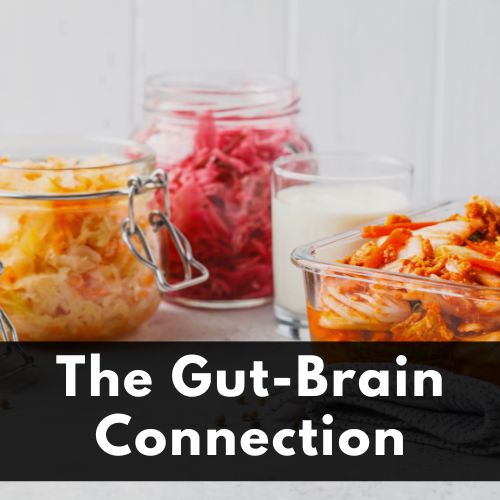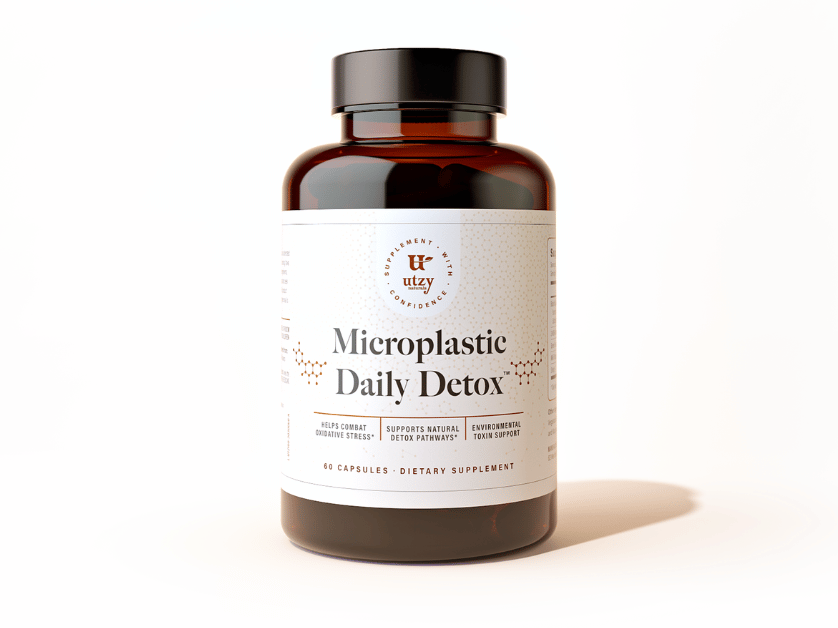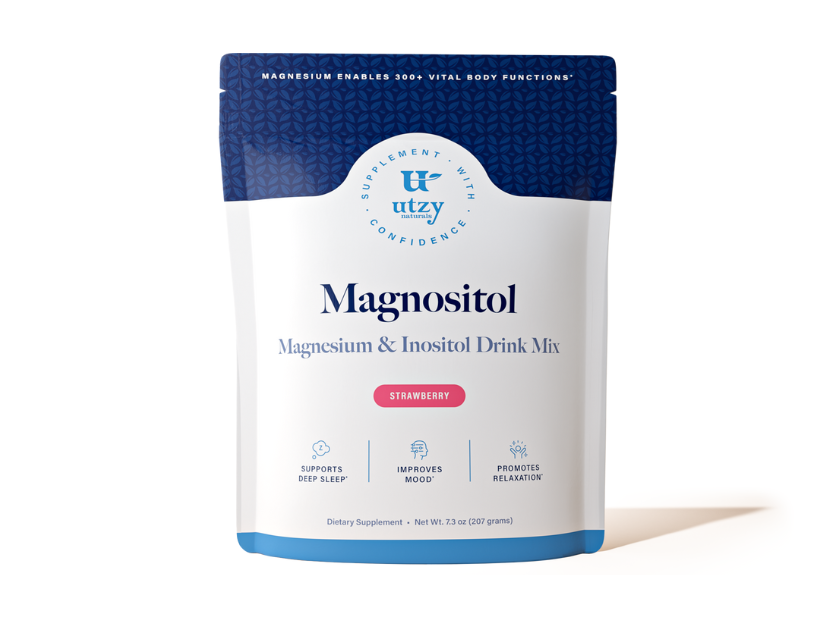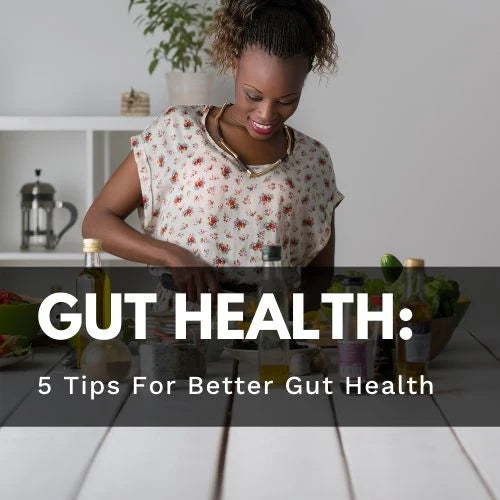Save up to 25% during our FRESH START Sale! SHOP NOW
Save up to 25% during our FRESH START Sale! SHOP NOW
shop
learn

The Gut-Brain Connection and How It Impacts Your Health
May 01, 2025 4 min read
-Written by Dr. Allison Brager
How often have you heard the phrase “you are what you eat”? Likely to the extent that you just roll your eyes when you hear it. But emerging discoveries on our gut microbiome are showing direct links between what we eat and how we behave, this is called the gut-brain connection.
Simply put, what we eat affects how we react and adapt to stress, as well as how much and how well we sleep (you can read a list of sleep tips here). So let's talk about the gut-brain connection and how it impacts our health.

What Is The Gut Microbiome?
First off, let's define the word "Microbiome". The word 'microbiome' is intimidating. This four-syllable word is cleverly used to describe the trillions (yes, trillions) of microbes - bacteria and fungi - currently occupying your gut.
While this may sound kind of scary, the majority of these microbes are not bad. In fact, most of the microbes that occupy your gut contribute to your general health and well-being.
Since gut heath is so impactful on overall health, it is important to try and increase ‘good bugs’ and to decrease ‘bad bugs’. You can do this by focusing on getting good nutrition, reducing your stress levels, and by making quality sleep a priority.
Key Benefits of a Healthy Microbiome:
Having a healthy gut leads to good health across the board. Below are some of the benefits of maintaining a healthy microbiome.

1. A Health Gut Leads To Better Sleep at Night:
Did you know that 90% of the body's serotonin supply is stored in the gut? Serotonin is one of a few 'happy, feel good' chemicals produced by the body. This is why the gut is often called out body's "second brain".
Serotonin also is the largest driver of how awake we feel throughout the day and how easily we fall asleep and stay asleep at night. Serotonin is typically described as a chemical 'stimulant' but often interacts with a chemical 'depressant' - GABA - to control and fine-tune our levels of happiness as well as our depth of sleep.
These highways of serotonin and GABA line the gut and in turn, influence our behavior not only during our awake hours, but also while we sleep
2. A Healthy Gut Helps With More Energized Days:
One can't argue that a quality day is a day free of stress, right? A good night's sleep often leads to a good day once you awake.
The gut-to-brain connection and sleep-to-gut connection can also protect against bad days. Because Serotonin is a 'happy, feel good' chemical and GABA helps to fine-tune the level of happiness and overall energy.
A gut full of good bacteria can help ensure that the highways of Serotonin and GABA that line the gut are primed for happiness and goodness throughout the day.
How to Optimize Your Microbiome:
Below are top tips on how to increase the health of your gut.
1. Prioritize Prebiotics and Probiotics
Probiotics promote the production of good gut bacteria. Prebiotics are the fuel source for probiotics. Hence, prebiotics are the catalyst for a healthy microbiome and as a recent study in mice has found, prebiotics promote healthy, quality sleep (Source).
Sleep optimizes body repair and rejuvenation and the gut is no exception to repair and rejuvenation by sleep. Fermented foods are a natural source of prebiotics and probiotics. The process of fermentation favors the production of healthy bacteria. Eat some kimchi (or even sauerkraut!).
Better yet, grab a bottle of blue-green algae kombucha for a double bang for your buck! You can read out list of the best kombucha brands here
2. Avoid Antibiotics If At All Possible
Antibiotics destroy healthy gut bacteria. A well-known side effect of taking an antibiotic involves your body's healthy gut bacteria literally being flushed from your system.
Instead, recent studies suggest banking on prebiotics and probiotics to help protect against unforeseen illness.
In the sleep field, we have seen antibiotics disrupt and destroy the gut, while simultaneously destroying circadian rhythms of sleep and behavior in mammals. Antibiotics can set the 'body clocks' on a whacky, shift-work like schedule, leading to disrupted sleep and unusual activity patterns (including over-eating!).
3. Prioritize Exercise.
Exercise is stressful on the body and our physiology. But much like how gut microbes are mostly good, exercise-induced stress is also (really) good. Exercise-induced stress actively re-wires the body, physiology, and our gut to help protect us from harmful stress or to help us adapt and recover quicker from stress.
The gut is no exception to exercise-induced adaptation. Exercise favors the production and sustainment of good over bad bacteria.
Exercise can be as simple as taking a long walk every day. However, keep in mind, that with exercise, you get out what you put in. So push the intensity (while keeping it safe) and start reaping the benefits of exercise!
4. Prioritize Quality Sleep
As we have discussed in several posts, sleep is restoration for your body (you can read our recent article on non-REM sleep here). Sleep helps to keep our 'body clocks' on schedule. Sleep helps to repair and rejuvenate the body so we can be our best day after day. The process of repair and rejuvenation via sleep is widespread, and the gut is no exception.
If you are looking for a high quality sleep aid supplement, check out our line of natural sleep aids!
Nourish your gut-brain connection, sustain your sleep-gut connection, and thrive on a fit and happy microbiome!
______________________________________________________________________________

Dr. Allison Brager is a neuroscientist specializing in the physiology and genetics of sleep and performance. She is author of Meathead: Unraveling the Athletic Brain, which debunks the myth of the "dumb jock" and serves as a manual for optimizing athletic performance through neuroscience. Outside of the laboratory, she is a former college athlete, Crossfit Games team athlete, and is still active in track and field: pole vault and hurdles.
Other Resources for Optimizing Sleep:
1. My book, “Meathead: Unraveling the Athletic Brain” describes several "neurohackers" for bettering athletic performance through science.
2. Podcast on How to 10x Your Sleep.
1 Response
Leave a comment
Comments will be approved before showing up.
Also in Health
Subscribe
Sign up to get the latest on sales, new releases and more …
Join the Utzy Naturals Club!
Sign up and get the latest on sales, new releases, and more...






theta healing
May 11, 2018
once that is done, you believe in yourself and go for what you want in life.